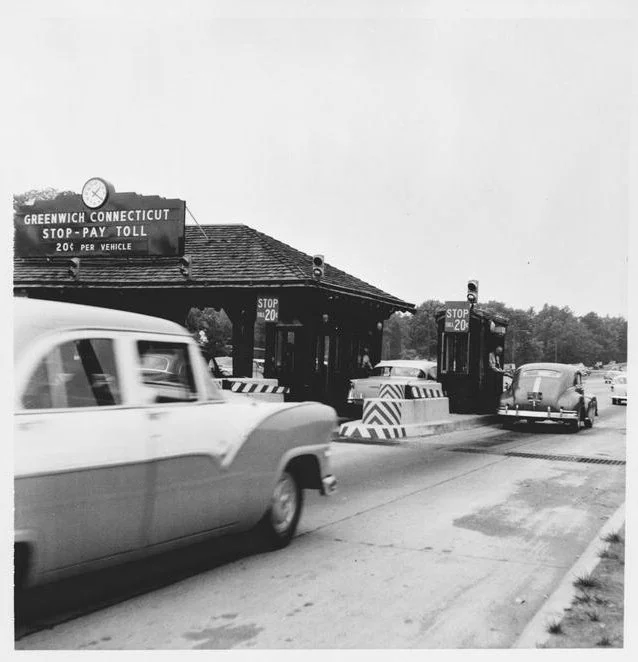Toll booth on Connecticut’s Merritt Parkway in 1955. There are no longer toll roads in the Nutmeg State.
MANCHESTER, Conn.
Most Connecticut state legislators purport to hate the car tax -- that is, municipal property taxes on automobiles. A special committee of the General Assembly has been created to review the tax and suggest alternatives for raising the billion dollars it pays into municipal government treasuries each year.
Since cars are sold more frequently, collecting the property tax on cars is more complicated than the property tax on residential and commercial property. Since the property tax on cars is not escrowed as property taxes on mortgaged properties usually are, car taxes fall unexpectedly on many people when the bills arrive from the local tax collector. As the economy weakens, poverty worsens, and more people live from paycheck to paycheck, the car tax is resented even more.
Another complaint is that the car tax is unfair because identical cars may be taxed much differently among towns. But this isn’t peculiar to the car tax; it’s a function of differences in local tax rates. Similar residential and commercial properties are taxed differently among municipalities as well because of different tax rates, and different rates are not necessarily bad, insofar as some municipalities choose to spend and tax much more than others.
Eight years ago a state law reduced the disparities in car taxes, imposing a car tax cap of 32.46 mills. According to the Waterbury Republican-American, the car taxes of 54 municipalities are capped -- that is, their general property tax rate is higher than the car tax cap. The disparities in taxes on similar cars have been reduced but often remain sharp.
A mill equals $1 of tax for each $1,000 of a property’s assessed value. Property tax is calculated by multiplying a property’s assessed value by the mill rate and dividing by 1,000. For example, a motor vehicle with an assessed value of $25,000 located in a municipality with a mill rate of 20 would have a property tax bill of $500.(The disparities in all municipal property tax rates result mainly from the concentration of poverty in the cities, which in turn results mainly from the concentration of the least expensive housing there and from the decision of municipal officials, under political pressure and the pressure of state labor law, to pay local government employees more generously, as well as from the inefficiency encouraged by large grants of state financial aid.
Inconvenient and unfair as the car tax may be, the real problem with it is that legislators and governors don't dislike it as much as they like the revenue it raises and the ever-increasing spending they require in state and municipal government. Indeed, the most obvious remedy for the dislike of the car tax isn’t even proposed -- to reduce municipal spending or reduce state spending and redirect the savings to municipalities.
As always, cutting spending is out of the question at both levels of government, even in the face of policies and programs that don’t achieve their nominal objectives. The broadest and most expensive policies and programs, like education and welfare for the able-bodied, are never audited for their failures. To the contrary, their failures are mistaken as evidence to do still more of what hasn’t accomplished what the public imagines the objectives to be.
That is, politically the status quo is loved far more than the car tax is hated.
Since even $100 million in spending cuts can’t be found in state and municipal budgets, how could state government find the billion dollars needed to eliminate the car tax?
Of course state Senate President Martin M. Looney, Democrat of New Haven, has his usual idea -- raising taxes on the wealthy, particularly on their capital gains. Progressivity in taxation is always a fair issue and matter of judgment, but in Connecticut it is meant less as justice than as protection for inefficiency and patronage.
Another idea is an 8 percent sales tax on homeowner and auto insurance policies. That wouldn't be more popular than the car tax, if people noticed it. But they wouldn't if it was levied against insurers on a wholesale basis, like the state’s wholesale tax on fuel and the taxes on electric utilities that are passed along hidden in electricity prices. Then the sales tax would be hidden in the price of insurance, and insurers, not state government, would be blamed for the price increases while legislators congratulated themselves for eliminating the car tax at last.
Chris Powell has written about Connecticut government and politics for many years. (CPowell@cox.net).










